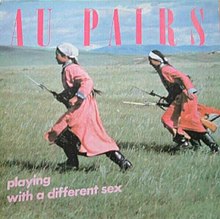Playing with a Different Sex
| Playing with a Different Sex | ||||
|---|---|---|---|---|
 |
||||
| Studio album by Au Pairs | ||||
| Released | 1981 | |||
| Recorded | April 1981 at Jacobs Studios, Surrey, England | |||
| Genre | Post-punk | |||
| Label | Human | |||
| Producer | Ken Thomas, Martin Culverwell, Au Pairs | |||
| Au Pairs chronology | ||||
|
||||
| Professional ratings | |
|---|---|
| Review scores | |
| Source | Rating |
| AllMusic | |
Playing with a Different Sex is the debut studio album by English post-punk band Au Pairs. It was released in 1981, through record label Human.
In its retrospective review, AllMusic described the album as "one of the great, and perhaps forgotten, post-punk records." The album peaked at No. 33 in Britain and launched the single "It's Obvious", which reached No. 37 on the Club Play Singles charts in America in 1981.
The album was re-released in 2000 on CD by RPM Records, a subsidiary of label Cherry Red. The 2000 release includes an additional eight tracks, consisting of singles, remixes and previously unreleased songs.
Many of the songs on the album deal with sexual politics. In "Repetition", a David Bowie cover, domestic violence is explored ("I guess the bruises won't show/If she wears long sleeves"), and the possessiveness underlying an open relationship is pilloried in "We're So Cool" ("you must admit/I'm prepared to share/At off-peak times").
Allegations of rape and torture of Irish women imprisoned in the city of Armagh in Northern Ireland are the core content of the song "Armagh", which challenges the notion that "civilized nations" do not torture. "We don't torture, we don't torture/American hostages in Iran" the lyrics say, following which the song turns to the situation in Ireland: "There are thirty-two women in Armagh jail/Political prisoners here at home", before describing alleged incidents of abuse. The song led to limited distribution of the album in Ireland, when Northern Irish record distributors refused to carry it.
The song "Come Again" refers to the social pressure to "achieve orgasmic equality"; a 1982 profile in Mother Jones notes that the song depicts sex "as a dreary ritual in which partners as joyless as lab rats press bars and nose buttons in the hopes of an orgasm as dry and quantifiable as kibble." The song, directed at "those who changed the game" and "brought in new rules", asks "is it real? Are you feeling it?", before turning into a dialogue between the female lead singer and male back up who is evidently attempting to satisfy her: "Am I doing it right?" he asks, and the woman reassures him, "You're not selfish/You're trying hard to please me – please, please me/Is your finger aching?/I can feel you hesitating." The song was banned from the BBC, who feared parental backlash.
...
Wikipedia
